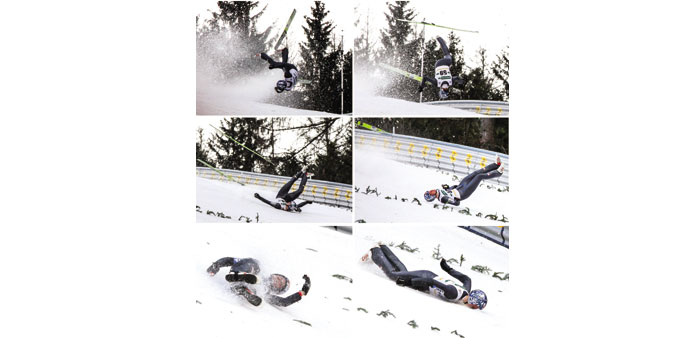The sequence of pictures show Austria’s Thomas Morgenstern crashing during a trial round for the FIS Ski-Jumping World Cup in Bad Mitterndorf, Austria, yesterday. (EPA)

Austrian ski-jumping star Thomas Morgenstern was taken to hospital after crashing badly for the second time in a month in the Olympic season yesterday, on the massive Bad Mitterndorf flying hill.
Morgenstern, 27, lost control during in a training jump for the weekend World Cup events, turned to his left after his skis seemingly touched, and hit the ground hard with his back and head before skidding down the hill.
He was briefly knocked unconscious by the impact, but regained consciousness quickly and received first treatment next to the hill before being taken to hospital in Salzburg. It was not known immediately whether he was injured.
“He was taken to hospital for further checks because he was unconscious briefly,” team physiotherapist Herbert Leitner told Austrian broadcaster ORF. “He was responsive and could move his arms and legs. That is very important. He wanted to know what happened.”
Austrian coach Alexander Pointner said there was no final diagnosis yet by mid-afternoon.
“It really hurts because you are so helpless. ... He is the heart of our team. It hurts everyone badly when he crashes. I hope for the best for Thomas,” Pointer said.
The three-times Olympic and seven-times world champion Morgenstern also crashed on December 15 during competition on the German hill of Titisee-Neustadt, the day after winning his first World Cup event of the season at the same venue.
He was unconscious briefly, escaped with a broken finger and bruises, and returned two weeks later to finish second in the Four Hills Tour behind surprise winner Thomas Diethart and currently rank fifth in the World Cup.
The latest crash comes less than a month before the start of the Sochi Winter Olympics where he is rated a medal contender.
Morgenstern also had a major crash 2003 in Kuusamo, Finland, when hit by a gust of wind in mid-air. He got away with minor injuries.
He admitted in a report published yesterday by Germany’s Sueddeutsche Zeitung that he is yet to fully overcome that crash and is concerned especially on windy competition days.
“I have not overcome it in a way people believe I have. It is always in my head when there are windy conditions,” he said. “I have been lucky in my crashes. There is the fear that something may happen one day.”
Russia allocates park for protesters at Sochi Games
Russia said yesterday that protests will be allowed at the Sochi Winter Games next month—but only in a park located away from the main Olympic venues.
Deputy Prime Minister Dmitry Kozak said protesters at the Black Sea resort of Sochi will be able to gather in a park in the seaside suburb of Khosta.
“People can freely express their opinion (there), while not breaching the rights of other citizens or the Olympic Charter,” Kozak was quoted as saying by local media in Sochi.
“At the sports stadiums, at the sports venues, in accordance with the Olympic Charter, expressions of political opinions are banned,” he added.
The suburb of Khosta is located around 18 kilometres
(11 miles) from the Olympic Cluster, containing the Olympic Stadium and other venues, and around 20 kilometres from central Sochi.
Russia’s hosting of the Winter Games has prompted a storm of international concern over its rights situation, particularly a ban on promoting homosexuality to minors.
President Vladimir Putin last year issued a decree on security banning all public protests unrelated to the Games from January to March this year.
But after discussions with the International Olympic Committee, this month Putin issued an amended decree to allow protests at venues sanctioned by Sochi city authorities, police and security forces.
Kremlin spokesman Dmitry Peskov specified that protests would be allowed in only one location of the sprawling Black Sea resort city.
Russia this week launched an unprecedented security clampdown that includes restrictions on motorists entering a “forbidden zone” around Sochi as well as patrols by army troops and monitoring by drones.
Russia is on high alert after two suicide bombings last month in the southern city of Volgograd killed 34 people.
